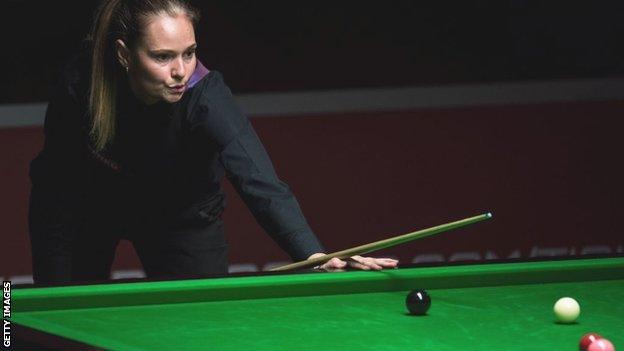Reanne Evans 'proud' after narrow Champion of Champions loss to Shaun Murphy
- Published

Reanne Evans won three consecutive frames against 2005 world champion Shaun Murphy
Reanne Evans says she is "gutted" but "proud" after being a frame away from becoming the first woman to beat a man in snooker's top 16.
Evans fought back against world number eight Shaun Murphy, before losing 4-3 on her Champion of Champions debut.
She won a World Championship qualifier against Robin Hull in 2017, but a woman has never come closer to beating an elite male player in a televised event.
"I had him on the ropes a little bit at the end," Evans told BBC Radio Four.
"At the start I played so poorly. I won a frame and got into the match a bit. I went from being nervous, embarrassed to really proud, gutted."
Englishman Murphy, who was later beaten 6-5 by Neil Robertson of Australia in the Group Four final, feels compatriot Evans' achievements deserve more credit.
"It's a funny world we live in. This woman here, she's a 12-time [women's] champion of the world completely disregarded by the general British sporting public at large," the 37-year-old told ITV4.
"People are throwing MBEs and awards out at people left, right and centre - she's got 12 world titles to her name and nothing after her name. It's a disgrace."
Evans, 34, recorded a highest break of 51 in the biggest payday of her career, with first-round losers at the Ricoh Arena receiving £12,500.
She was 3-0 down after an untidy start but took the match to a decider, which Murphy won in style with a 130 beak.
"I respect Shaun for saying all that and I agree - but it's up to other people. It's a frustrating game sometimes where you're at the top of your sport but you don't really get recognised for it," Evans told the Today programme.
"It just shows what a class act he is. He kept his nerve."
At the Snooker Shoot Out earlier this year, Evans and Emma Parker became the first women to play on television in the final stages of a ranking event in the UK.
Both lost in round one, but Evans is enjoying any opportunity to demonstrate her talent.
"Sometimes you are still not allowed to play in certain clubs, so there is still that stigma, but we are getting there very slowly," she said.
"It spurs me on really. I grew up around a lot of male players, including my brothers, so I'm hardened to it and I just let my snooker do the talking."